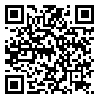

BibTeX | RIS | EndNote | Medlars | ProCite | Reference Manager | RefWorks
Send citation to:
URL: http://jdisabilstud.org/article-1-3624-en.html
2- Assistant Professor, Department of Psychology, Ardabil Branch, Islamic Azad University, Ardabil, Iran
3- Assistant Professor, Department of Psychology, Rasht Branch, Islamic Azad University, Rasht, Iran
Abstract
Background & Objectives: Today, eating disorders are considered one of the most challenging disorders in psychiatry to treat, of which the most notable is bulimia nervosa. Bulimia nervosa is a type of eating disorder that is defined as periodic binge eating accompanied by inappropriate methods of preventing weight gain. People who suffer from bulimia nervosa also experience problems in various psychological aspects. In this regard, the results of studies have pointed to the self-regulatory behaviors and low self-esteem of these people. Despite the necessity felt in the field of self-regulatory behaviors and self-esteem in female university students with bulimia nervosa as the main pillars of building the future of the country, there is a fundamental research gap in this field. Additionally, given the importance of this group's health and the need for effective psychological interventions within this statistical population, further research in this field is necessary. Finally, this study aimed to determine the effectiveness of positive psychotherapy on behavioral self-regulation and self-esteem of female students with bulimia nervosa.
Methods: The quasi-experimental research employed a pretest-posttest and a three-month follow-up period design with a control group. The statistical population of this study included all female students with bulimia nervosa at universities in Miandoab City, Iran, in the academic year 2024-2025. From this population, 40 eligible individuals were enrolled in the study using the convenience sampling method and randomly assigned to the experimental and control groups (20 individuals in each group). The inclusion criteria for the subjects in the study were as follows: female gender; diagnosis of bulimia nervosa based on the Eating Disorders Diagnostic Scale (Stice et al., 2004) with a cut-off score of 24 or higher; age range of 18 to 40 years; participation in positive therapy training sessions; willingness of participants and written consent; completion of the consent form for participation in the study; not taking medications related to bulimia nervosa; and not taking neuropsychiatric medicines based on a self-declaration form. The exclusion criteria for the subjects from the study were absent from more than two sessions of positive therapy training sessions and failure to complete the assignments included in the positive therapy sessions. Ethical considerations, including the principle of scientific confidentiality and respect for the authors' rights to choose, freedom, and intellectual property, were observed. The subjects were included in the study following these ethical considerations and the stated objectives. They were assured that all information would be confidential and would be used for research purposes. To respect privacy, the names and surnames of the participants were not recorded. The measurement tools were the Behavioral Self-regulation Questionnaire (Carey et al., 2004) and the Self-esteem Scale (Rosenberg, 1965). The experimental group underwent 8 sessions of 70-minute positive psychotherapy, and the control group did not receive any intervention. Data analysis was performed using descriptive statistics (frequency, percentage, mean, and standard deviation) and inferential statistics, including independent t test, Chi-square test, analysis of variance with repeated measures, and Bonferroni post hoc test at a significance level of 0.05 in SPSS version 23.
Results: The results showed that the group, the time, and the group × time interaction effects on the variables of self-awareness, goal setting, action planning, self-monitoring, and self-esteem were significant (p<0.05). Also, in the experimental group, the difference between the mean scores of self-awareness, goal setting, action planning, self-monitoring, and self-esteem variables between the pretest and the posttest and follow-up was significant (p<0.05). However, in the experimental group, the difference between the mean scores of the aforementioned variables between the posttest and follow-up was not significant (p>0.05), indicating the stability of the effect of the positive psychotherapy intervention over time.
Conclusion: According to the findings, positive psychotherapy is effective in increasing behavioral self-regulation and self-esteem of female students with bulimia nervosa. So, it is suggested that positive psychotherapy, along with other psychological interventions, be used as one of the effective methods in improving behavioral self-regulation and self-esteem of female students with bulimia nervosa.
| Rights and permissions | |
 |
This work is licensed under a Creative Commons Attribution-NonCommercial 4.0 International License. |


